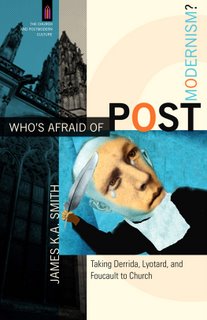I'm not afraid of post modernism
 Who's Afraid of Postmodernism?
Who's Afraid of Postmodernism?I’ve spent a bunch of time walking through the dense forest of continental post modernity, and I must say that the path nor the destination have been overly encouraging. The branches of Derrida, Lyotard, and Foucault (I would add Deleuze but he doesn’t appear in this book) would whack me up the side of the head but I wouldn’t know exactly where I was going or where I was getting lead. I knew that there was Truth here residing in the pages (or on the margins as the case may be) but it was very difficult to see how I could be both faithful and post modern. I wanted to have the post moderns liberate me but instead I felt constrained, first by their opaqueness and second by an almost hopeless feeling that emanated from the pages.
Thankfully, James K. A. Smith has trimmed the forest, shredded the extra brush and constructed a usable structure out of postmodernism. Parts of Derrida, Lyotard and Foucault get claimed for Smith’s Radical Orthodoxy project. Post modern purists, if there in fact can be such a thing in such a radically diffuse group, will debate with Smith’s interpretations of these continental giants but I can say that, at least from my reading of all of the primary texts that he quotes, Smith knows what he is talking about. He is not ignorant to the shortcomings of these philosophers or the potential roadblocks to taking their theories into the church. Rather, he uses post modernity against the true enemy of the church – modernity. Without perpetrating an injustice against these French philosophers, Smith finds in their critique of modernity a hammer which he can chisel the church away from its death grip on modernity.
This is where I must come back to how I got onto Smith in the first place. In an exchange this past summer, Walt Mueller suggested that I read this book and for that I am thankful and can say that blogging has been an edifying experience. I’m confused however, how Mueller can recommend this book which clearly comes out against modernity and still have a suspicious view of post modernity. Some of Mueller’s critiques of post modernity, for instance the charge that post modern culture leads to a radical relativism or is necessarily nihilistic, are not in fact products of post modernity but actually the pinnacle of modern logic and ethics. For too long the church has been held captive to modernity (and more recently modernity’s offspring consumer culture) and Smith provides the tools to liberate North American Christians. I wish that Mueller had taken Smith’s work and moved it into the realm of youth ministry.
I have not been convinced that the Radical Orthodoxy project, at least the Millbank and Pickstock parts that I’ve been exposed to in the past, will play out as a viable alternative to something like neo-orthodoxy for instance, but it has enough to recommend it at the moment to investigate. I am interested in the Church and Postmodern Culture series. After reading Ward’s take on Barth I am not sure that all of the contributors are as good as Smith but I am willing to postpone judgement to see what comes of this project.
Labels: hermeneutics, pop culture



0 Comments:
Post a Comment
<< Home